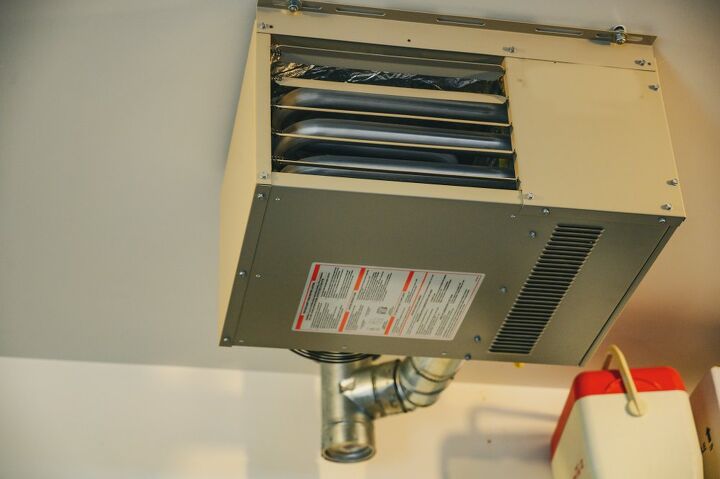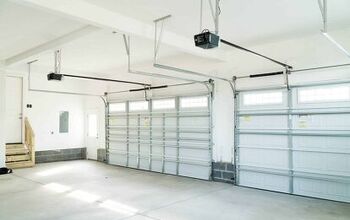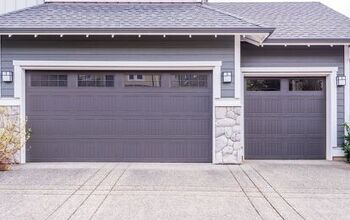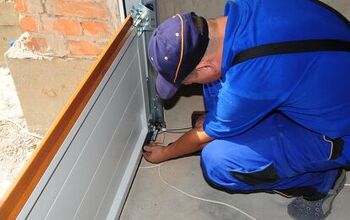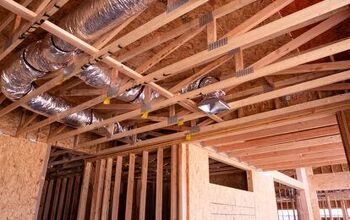Garage Heater Installation Cost

Garage heaters are a lifesaver if you want to protect your vehicle when you live in a cold climate. They can be pricey to install, however, and the average garage heater costs $2,600 to install. Whether it be the type of gas or the size of your garage, let’s take a look at how much it costs to install a garage heater.
If you are considering upgrading your heating or air conditioning system, get a quote from local contractors in your area here.
A cold garage can lead to a car that doesn’t hold up and perform as well as it should. A garage without heat can also affect the way that your home loses or retains heat. Garage heaters can solve this problem, keep the space warm, and protect your car, but how much does it cost to install one?
You can expect to pay between $1,200 and $4,000 to purchase and install a garage heater. This cost includes the professional’s labor rate, installation, materials, and the garage heater itself. Natural gas heaters cost between $400 and $800, and electric garage heaters average $250 before installation.
Otherwise, you can save money and purchase a portable garage heater for $50-$200 that you can install without the help of a professional. Garage heaters also come with monthly costs that can add $25-$100 or more to your utility bills. Follow along as we explore the differences in costs between garage heaters, and how much it costs to install them.
How Much Does It Cost To Install a Garage Heater?
Homeowners spend between $1,200 and $4,000 to install a garage heater, but it can cost up to $5,000 or more. Costs vary based on how big your garage is, and what kind of garage heater you choose. There are several types of garage heaters, such as electric, infrared, and natural gas-powered units that vary in cost.
Not all homeowners need to run a gas line to their garage to install a heater, and that can save hundreds of dollars. Several cost factors determine how much you’ll spend on garage heater installation, such as:
- Gas line
- Ventilation
- Type of garage heater
- Materials
- Labor
The most expensive options are to install a furnace or infrared heater in your garage. Labor rates vary from professional to professional, and installation depends largely on your garage’s size. Let’s take a look at all of the factors that determine how much your garage heater installation will cost.
Cost To Install Furnace In Garage
It can cost as much as $4,000 or more to install a furnace in a garage, but the average homeowner spends $2,500. Generally, HVAC professionals split up the bill between the furnace unit, running the gas line, installation, and labor. Most homeowners require between 45,000 and 60,000 BTUs to heat a 2-3-car garage, and that affects the cost.
You can avoid some costs if you already have a gas line in your garage or ventilation in place. However, adding a gas line and ventilation can add hundreds of dollars to your installation bill. Most local building codes require that you ventilate any fixture in your home that has a gas line for safety purposes.
Cost To Run a Gas Line To a Garage
Professionals generally charge you $15-$20 per linear foot to run a gas line to your garage. These costs include labor and materials, but the size of the garage makes the biggest difference. For example, it’s pricier to run gas lines to a 2 or 3-car garage than it is for a single-car garage.
This makes up a moderate part of the cost to install a garage heater, as the heater itself only costs between $300 and $800. You can expect to pay at least $250-$550 to run a gas line to your garage when you hire a professional. That applies to standard gas lines for a traditional 1-3 car garage, and most homeowners spend under $300 for a gas line.
You need to run a gas line if you have the most high-end garage heaters, such as infrared natural gas heaters. The gas line creates a flame inside the heat exchanger to allow warm air to spread throughout the garage. This is ideal because it directly heats the garage and key items, such as your car, evenly throughout the space.
Cost To Add Exhaust Vent To Garage
It only costs $100-$500 to add an exhaust vent to your garage to safely ventilate the space. Costs generally stay below $150, but it’s pricier if they need to do a lot of carpentry. They need to open up the walls or ceiling to create a path for the exhaust vent.
In that case, you can expect to spend closer to $300-$500 depending on how much work they need to complete. However, some garages already have ventilation in place from a previous homeowner or addition, and that can save you money.
Best Garage Electric Heaters
Garage Heater Cost
There are five main kinds of garage heaters that you can choose from: electric, propane, natural gas, infrared, and portable. Portable garage heaters stand on their own as you don’t need to hire a professional to install them. Infrared garage heaters are unique because there are electric and natural gas-powered varieties.
Garage heaters themselves make up a small part of the installation, but it’s important to know the difference in cost. Let’s take a look at the difference in the base cost between each of the types of garage heaters.
Electric
The average homeowner spends $250 for an electric garage heater, but they add a fortune to your energy bills. You can save money on the installation because you can set up an electric garage heater on your own in most cases. They are easy to install, and that can save you hundreds or even thousands of dollars in labor costs.
However, electric garage heaters can also cost you as much as $100 or more in monthly energy bills. Energy bills can cost as little as $25 per month if you run your electric garage heater sparingly only when it’s cold. Electric garage heaters are an affordable alternative to installing a furnace in your garage.
You can also purchase ceiling-mounted electric garage heaters, and that can add $100-$200 to installation. Ceiling-mounted electric garage heaters are a great option because they evenly circulate the warm air throughout the garage.
Natural Gas
Natural gas garage heaters cost $600, on average, but many units cost $400 or less. You can pay as much as $800 for a natural gas garage heater before the cost of installation, however. Natural gas infrared units are the most powerful garage heater, and they can save you on bills.
Your energy bills aren’t as high as electric garage heaters, and natural gas is energy efficient. Generally, natural gas is considered the cleanest option because there isn’t much exhaust or many impurities. Infrared natural gas heaters can be more expensive, however, but they offer the best efficiency.
Infrared
You can find infrared garage heaters that are gas or electric-powered, and they offer the best performance. They boast energy efficiency that is superior to standard electric, propane, or natural gas garage heaters. Infrared garage heaters are as much as 50% more efficient than standard heaters, and they work much differently.
For example, infrared garage heaters heat the surrounding air in your garage more like the sun than a heater. This creates a change in the environment in your garage instead of constantly filling the space with hot air. That is why infrared garage heaters are so energy efficient, and they often prevent the loss of warmth in the garage.
Homeowners generally spend between $400 and $800 for an infrared garage heater, but prices vary. Electric infrared garage heaters are cheaper than natural gas, but they also increase energy bills by up to $100.
Propane
Garage heaters that operate via propane gas generally cost between $250 and $1,200, but they can exceed those prices. Propane garage heaters are powerful because they create a flame to help circulate air throughout the garage. Some basic propane garage heaters cost as little as $250, but the cost of propane and installation adds hundreds in costs.
Other costs with propane garage heaters include ventilation installation, as that is a safety requirement. Propane is right up there with infrared when it comes to heating performance, and it is just as powerful. They can be expensive to run, however, and propane garage heaters typically cost $25-$30 per 1,000,000 BTUs.
Natural gas costs nearly half as much to run, but propane garage heaters are still cheaper than electric units. You will likely spend at least $15-$25 per month or more to run a propane garage heater if you use it often in colder months.
Portable Garage Heater
Portable garage heaters only cost between $50 and $200, on average, and they are the cheapest option. Some high-end models use propane that costs up to $600 or more, but most of them are under $200. Generally, portable garage heaters are optimal for 1-car garages because they often support 40,000 BTUs.
You need at least 45,000-60,000 BTUs for a 2 or 3-car garage, so portable heaters don’t always cut it. Higher-end models cost $200 or more and can often heat up to 3,000 square feet or more at 100,000 BTUs. However, portable garage heaters can cost as much as standard electric heaters and can increase your bills.
That means that you might pay an extra $50-$100 per month to run a portable heater even if it only costs $50 itself. Portable garage heaters are worth it if you don’t want to spend the full cost to install a furnace or infrared heater.
How Much Does It Cost To Run a Garage Heater?
It can cost you up to $1,000 or more to run a garage heater throughout the year, but it varies by type. Electric heaters are the most expensive as they can add $20-$100 or more to your electric bills each month. Natural gas bills vary based on where you live, but they are often 40% cheaper each month than electric garage heaters.
You are charged based on how many BTUs, or British Thermal Units, you use when you run the garage heater. The common grouping is 1,000,000 BTUs, and that costs $30-$40 for an electric garage heater which is the priciest to run.
Garage Heater Type | Cost Per Million BTUs |
| Electric | $30-$40 |
| Natural Gas | $15-$20 |
| Propane | $25-$30 |
You can keep garage heater costs to a minimum if you limit how often you use them. Invest in better insulation in your garage if you want to get the most out of the least amount of heat to save money.
Related Questions
How many BTU does it take to heat a 2 car garage?
You generally need to purchase a garage heater that gets up to 45,000 BTU to heat a 2-car garage. However, you may need up to 60,000 BTU to run a heater for a large 2-car garage or a 3-car garage.
Do garage heaters need to be vented?
If your garage heater used natural gases to heat your garage, then it needs to be vented. Homeowners can vent their garage heaters because it doesn’t directly involve the gas line, and it isn’t dangerous. However, you should always hire a professional to install the garage heater itself because it can be dangerous to work with gas lines.
Should a garage heater make noise?
Garage heaters often make noise because the vibration causes the metal housing to rattle as it operates. This is normal, and it doesn’t often indicate that there is a problem with your garage heater in most cases. However, inordinate noises that you haven’t heard before may point to a problem with the heating element or filter if there is one.
Summing It Up
It costs between $1,200 and $4,000 or more to install a garage heater. However, the average homeowner spends $2,500 on the unit, labor, and installation. The priciest option is to install a full furnace, and that can exceed $4,000 if you ventilate it and run a gas line.
It’s the most expensive to heat a 2 or 3-car garage because you need at least 45,000-60,000 BTUs. That means that you’ll spend as much as $25-$100 or more to run your heater each month. Garage heaters are worth it because they protect your vehicles and work to insulate the rest of your home.
Related Articles
UpgradedHome participates in affiliate programs. When you purchase through our links, we may earn a commission.

Nick Durante is a professional writer with a primary focus on home improvement. When he is not writing about home improvement or taking on projects around the house, he likes to read and create art. He is always looking towards the newest trends in home improvement.
More by Nick Durante



